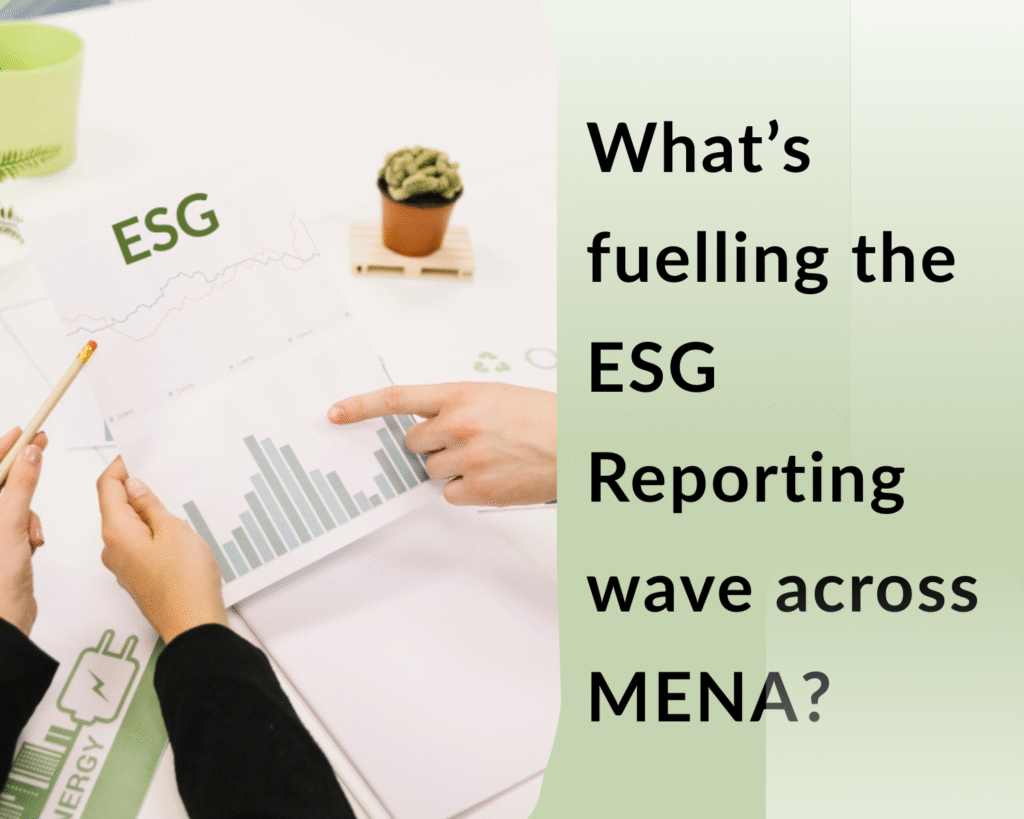In the Middle East and North Africa (MENA), ESG reporting has moved from the sidelines into the spotlight. What was once a voluntary exercise, often led by a handful of progressive companies, is now becoming a regional priority.
The shift is being driven by two powerful forces: growing stakeholder and investor expectations, and the rise of global ESG standards, particularly those introduced by the International Sustainability Standards Board (ISSB). For companies in the region, the message is clear: align with global frameworks or risk falling behind.
But what does this really mean for businesses on the ground? And how can they turn ESG reporting from a compliance headache into a strategic advantage?

Why ESG reporting is accelerating in MENA
Traditionally, MENA economies leaned heavily on fossil fuels. But as the world pivots towards low-carbon growth, the region is recalibrating. Today, ESG reporting in MENA is no longer just about reputation. It’s becoming a strategic enabler of growth, finance, and resilience.
Three main drivers stand out:
- Investor pressure :International funds want comparable, reliable ESG data before they invest.
- Government action: Regulators across the UAE, Saudi Arabia, Qatar, Oman, and others have introduced ESG disclosure guidelines—some mandatory, others voluntary.
- Net-zero ambitions: With national climate targets gaining pace, businesses need credible data to measure and communicate progress.
With national climate targets gaining pace, businesses need credible data to measure and communicate progress.
The question is: Will companies treat this as a compliance exercise, or as a chance to lead?
Regional progress: Country snapshots
Governments across the Middle East are steadily building regulatory frameworks for ESG reporting:
- UAE – Compulsory ESG reporting for listed companies since 2022
- Saudi Arabia – Sustainability disclosure guidelines launched in 2021
- Qatar – ESG reporting guidance issued in 2022
- Oman – Voluntary ESG disclosure rules since 2023; mandatory by 2025
- Bahrain – Introduced voluntary guidelines in 2020
- Kuwait – Released sustainability regulations in 2022
These initiatives show the region’s commitment to sustainable growth and signal to companies that ESG disclosure will soon be a non-negotiable requirement.
So where does this leave businesses that haven’t started their ESG journey yet?
How global standards are reshaping ESG disclosure
For more than a decade, companies struggled to navigate overlapping frameworks:GRI, SASB, CDP, and TCFD, each valuable but often confusing.
The launch of the ISSB standards (IFRS S1 & S2) is changing the game by creating a global baseline for ESG reporting. For MENA companies, this brings both clarity and challenge.
- Consistency and comparability : ISSB standards ensure MENA disclosures can stand shoulder-to-shoulder with global peers.
- Focus on financial impact : Companies must now link sustainability risks and opportunities directly to business performance.
- Investment in data systems : Meeting global requirements pushes companies to build robust tools for tracking carbon, water, energy, and supply chain metrics.
- Integration into strategy : ESG reporting is no longer an “extra”—it’s influencing corporate strategy, capital allocation, and performance measurement.
The bigger question: Are MENA firms ready to invest in the systems and skills needed to keep up?
The future of ESG in MENA
One thing’s for sure: ESG in MENA isn’t a “nice-to-have” anymore, it’s a must-do. Global standards like ISSB (IFRS S1 & S2) are raising the bar, and regional regulators are following fast. For businesses, this isn’t just about avoiding penalties; it’s about winning investor confidence, securing funding, and proving long-term resilience.
Think of it this way: companies that treat ESG as a compliance checkbox will always be playing catch-up. But those that see it as a strategic advantage—investing in strong **data systems, supply chain transparency, carbon tracking, and clear reporting—**are setting themselves up to lead.
The message is clear: align, adapt, and act now. In the race toward sustainable growth, the companies that move first will set the rules of the game.
